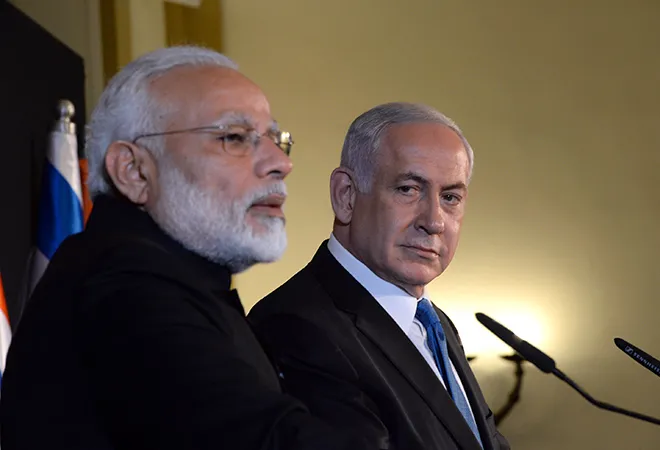-
CENTRES
Progammes & Centres
Location
India’s tilt towards Israel, Saudi Arabia, and the UAE is not a risk-free move.

Over the past few years, the course of India’s relations with Israel, Saudi Arabia, and the United Arab Emirates (UAE) suggests that under Prime Minister Narendra Modi, India finally appears to be moving away from its traditional “balancing” approach to West Asia. The Modi government has in practice demonstrated a preference for working with the three regional powers rather than Iran, a trend likely to be reinforced after the visit of Saudi Crown Prince Mohammed bin Salman (MBS) and the proposed trip by Israeli Prime Minister Benjamin Netanyahu to New Delhi.
Since the 1990-91 Gulf War, India has officially adopted a “balancing” approach to West Asia, which some view as a legacy of non-alignment. Although this approach has allowed India to eschew involvement in regional disputes and de-hyphenate relations with regional rivals including Iran, Israel and Saudi Arabia, the policy has also constrained India’s ability to press its geopolitical interests in the region.
Geopolitically, MBS and Abu Dhabi’s Crown Prince Mohammed bin Zayed (MBZ) have over the past few years escalated their battle against political Islamist groups, including the Muslim Brotherhood. Most notably, this materialised in their support for Egyptian President Abdel Fattah el-Sisi’s takeover of power in Egypt from the Muslim Brotherhood in 2013, and in their dispute with Qatar, a key regional backer of the group. Naturally, this brings them closer to Israel, which faces a growing threat from Islamist militant groups, including Hamas, Hezbollah, and Iranian-backed forces in Syria.
The campaign by Saudi Arabia and the UAE to curtail the influence of political Islamist groups also draws them closer to India. During his visit to New Delhi, the Saudi Crown Prince hinted at the attack by vowing to “cooperate in every way, including intelligence sharing.” In recent months, the UAE has also ramped up its security cooperation with India, extraditing at least three suspects wanted in relation to the AgustaWestland case.
Meanwhile, India’s defence and security partnership with Israel has already proven useful to its security and military modernisation drive. In 1998, Israel provided India with valuable intelligence on Pakistani positions during the Kargil war. More recently, India and Israel have collaborated on a $777 million project to develop a maritime version of the Barak-8, a surface-to-air missile that India successfully tested in January. India has also reportedly agreed to purchase 54 HAROP attack drones for the Indian Air Force and two airborne warning and control systems (AWACS) worth over $800 million from Israel. Due to its technological sophistication and warm relations, Israel has become one of India’s top suppliers of military technology.
Economically, the ability of Saudi Arabia and the UAE to mobilise investments despite low oil prices is a huge asset in their relations with India. Investments have included a $44 billion oil refinery in India by Saudi Aramco and the Abu Dhabi National Oil Company in partnership with an Indian consortium. During his visit to New Delhi, MBS said he foresaw up to $100 billion worth of Saudi investments in India over the next few years, including a plan by the Saudi Basic Industries Corp. to acquire two LNG plants.
In contrast, Iran’s support for Islamist militancy, not least by transferring advanced missile technology to Islamist groups and militias in Lebanon and Syria, has led to an increase in tensions with Israel, which responded by conducting air strikes against Iranian targets on Syrian soil in January. Although the simultaneous attacks that claimed the lives of 27 members of Iran’s Revolutionary Guard Corps and 40 members of India’s Central Reserve Police Force (CRPF) are likely to bring India and Iran closer together against Pakistan, it is doubtful that the occasion would generate much momentum in bilateral relations.
From an economic perspective, US sanctions have turned Iran into an unreliable economic partner. Despite obtaining a six-month waiver from the US in November on energy imports from Iran, India is shoring up plans to find alternative sources as the waiver reaches its term. Meanwhile, Indian investments in Iran, including the Shahid Beheshti complex at Chabahar and the Farzad B gas field, have languished for years, reflecting the severe constraints on doing business with Iran.
However, India’s tilt towards Israel, Saudi Arabia, and the UAE is not a risk-free move. Iran continues to exercise much influence in West Asia and can help shape events in Afghanistan by shoring up the Taliban against the US Moreover, Iran’s Chabahar port represents a strategic investment for India which hopes to use the facility to connect with the International North-South Transit Corridor (INSTC) that extends to Central Asia and to bypass Pakistan en route to Afghanistan.
Yet, as tensions rise in West Asia, Israel, Saudi Arabia and the UAE have coalesced more closely against Iran under the US-sponsored Middle East Security Alliance (MESA). Concurrently, recent escalation between Iran and Israel on the Syrian front suggests that tensions are unlikely to drop soon. Amid competing demands from West Asian powers for India to take sides, India might find it difficult to maintain a “balancing” approach even if it wanted to.
For now, the Modi government seems to have taken its pick. Having practically abandoned a “balancing” approach, the Modi government has, in effect, placed its bets on Israel and the Gulf monarchies, relegating relations with Iran to the side.
This commentary originally appeared in The Hindu.
The views expressed above belong to the author(s). ORF research and analyses now available on Telegram! Click here to access our curated content — blogs, longforms and interviews.

Professor Harsh V. Pant is Vice President – Studies and Foreign Policy at Observer Research Foundation, New Delhi. He is a Professor of International Relations ...
Read More +